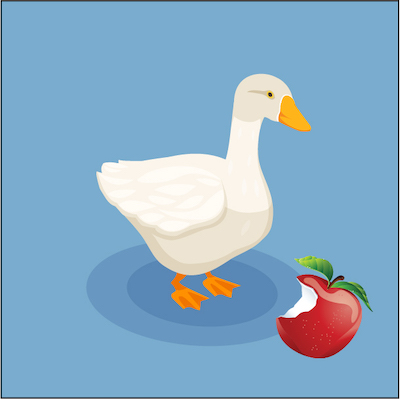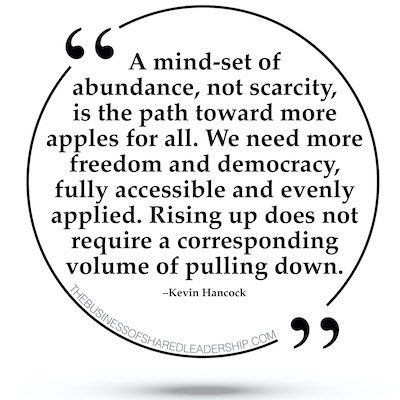2021 IDEA-SHARING ADVENTURE SERIES BY KEVIN HANCOCK
“Abundance is not something we acquire. It is something we tune into.”
—Wayne Dyer
 The Charles River Esplanade is a meandering urban green space separating Boston’s Back Bay neighborhoods from the Charles River. Filled with hardwood trees, playing fields, and exercise paths, the Esplanade traverses more than three miles, from the Museum of Science to Boston University. On any given day this scenic byway is filled with walkers, joggers, bikers, bench sitters, and geese—lots of geese.
The Charles River Esplanade is a meandering urban green space separating Boston’s Back Bay neighborhoods from the Charles River. Filled with hardwood trees, playing fields, and exercise paths, the Esplanade traverses more than three miles, from the Museum of Science to Boston University. On any given day this scenic byway is filled with walkers, joggers, bikers, bench sitters, and geese—lots of geese.
I was walking on the Esplanade one January morning when I witnessed a short sequence starring the geese that caused me to pause and reflect.
I was crossing an arched stone bridge. Beneath me ran a shallow stream partially covered by patches of thin ice. In a pool of open water twelve geese were casually drifting about when one of them spotted a half-eaten apple on an ice sheet nearby. As that goose moved with intention toward the apple the others began to take notice. Soon a race was on. Wings and feathers were set in motion as a cacophony of honking spontaneously erupted.
The original goose was first to the apple, but he knew time was of the essence. He slid across the ice, neck extended, trying to gather the entire prize in his mouth. But the apple would not cooperate. It slid and bounced its way back into the water where multiple geese fought for control. Moments earlier this flock had been peacefully gathered together for safety in a display of tribal unity. The presence of a single apple had been enough to make them turn on each other.
I reflected upon the implications of what I had witnessed for humanity. The instinctive wiring of life on Earth is grounded in a scarcity mind-set—the fear that there are not enough apples for everyone. Long before white men ventured onto the American plains, Indians fought, killed, and tortured other Indians for control of critical natural resources and hunting grounds. To be sure, like the geese, Indian tribes also came together and cooperated with each other as well. That’s really the point: Humanity, like all life on Earth, has always maintained a delicate balance between competition and cooperation.
How do our primal instincts advance or hinder social harmony and human collaboration in the twenty-first century? Might those instincts at times prevent us from seeing clearly, even keeping us fixated on the wrong problems?
The World Health Organization estimates there is 1.5 times enough food presently available to feed everyone on the planet. This would suggest that distribution, not scarcity, is the problem. Digging deeper in search of root causes, humanity has radically uneven economic productivity. The average household income in the United States is approximately $66,000, compared to $13,000 in Venezuela, $7,500 in Cuba, $3,400 in Ukraine, and $530 in the Congo. That’s not right. That’s not fair. That’s not optimal.
Why is this so? And what’s the solution?
One remediating strategy would be to take most of the money from places like the United States and send it to places like Cuba. That’s the scarcity mind-set model, and it wouldn’t work. Within a generation the income would be unevenly distributed again back in places like America. There is no net global benefit to lowering income in America. By the same reasoning, there is no net benefit to lowering income levels in Colorado ($77,000) in order to grow them in Mississippi ($46,000). (As an interesting aside, the highest average income levels in America are in the District of Columbia, $92,000.)
 An abundance mind-set would recognize that there are massive opportunities for productivity growth around the world. Getting there would require leaping two hurdles. First, we would need to initially over-invest in communities that have historically been exploited. Second, we would need to expand the conditions of freedom, democracy, and the rule of law to all the peoples of the world. Freedom for all is the solution, and that includes economic freedom. Corruption prevails wherever democracy and free markets are restricted. In America, for example, the historic problem has been the exclusion of some from the full rights of our democracy. We don’t need less freedom for some; we need full access to freedom for everyone.
An abundance mind-set would recognize that there are massive opportunities for productivity growth around the world. Getting there would require leaping two hurdles. First, we would need to initially over-invest in communities that have historically been exploited. Second, we would need to expand the conditions of freedom, democracy, and the rule of law to all the peoples of the world. Freedom for all is the solution, and that includes economic freedom. Corruption prevails wherever democracy and free markets are restricted. In America, for example, the historic problem has been the exclusion of some from the full rights of our democracy. We don’t need less freedom for some; we need full access to freedom for everyone.
My favorite current example of annual income disparity is that of Hong Kong and China. The annual household income in Hong Kong is $50,800, compared to $10,410 in China. So what is the Chinese Communist government’s strategic response to this discrepancy? It’s to make Hong Kong more like China. How do you think that’s going to work out?
Primal man, like the geese on the pond, fought over the scarcity of apples.
Modern man has the potential to grow more than enough apples for everyone.
A mind-set of abundance, not scarcity, is the path toward more apples for all. We need more freedom and democracy, fully accessible and evenly applied. Rising up does not require a corresponding volume of pulling down.
“The idea that political freedom can be preserved in the absence of economic freedom, and vice versa, is an illusion. Political freedom is the corollary of economic freedom.”
—Ludwig von Mises
* * *
Thank you for considering my thoughts. In return I honor yours. Every voice matters. Between our differences lies our future.
Sources:
https://www.worlddata.info/average-income.php
____________________